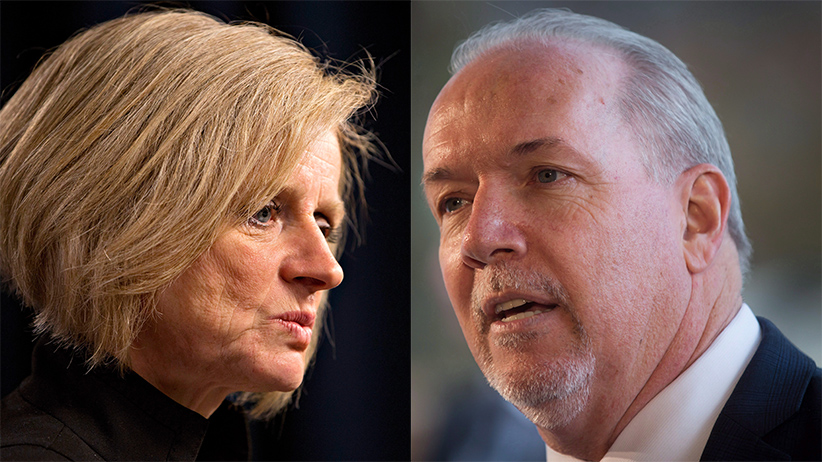With B.C.’s attack on Alberta oil, the war of mutual destruction begins
And this time, oil-by-rail gets tarred alongside pipelines
Share

If there’s one thing B.C. environmentalists aren’t well known for, it’s providing investor tips. But when the B.C. government announced this week plans to bar increases to diluted bitumen (oil sands crude) shipments while it launches a new panel study of spill research, the group Stand.earth advised Kinder Morgan investors to call their brokers because this will delay or permanently thwart the company’s federally approved Trans Mountain pipeline expansion. John Horgan’s NDP government had promised to use “every tool in the toolbox” to stop the $7.4-billion project, and Horgan seems to believe he’s found a particularly pointy one—though potential Alberta-B.C. trade war may ensue. (Eco-groups will supplement with what tools of persuasion they have as well; just don’t rely on them for wisdom on bond yields.)
B.C.’s oil-safety proposal may have given another category of investors cause to gulp as well. While all the activism and heated government rhetoric has concerned pipelines, B.C. Environment Minister George Heyman has made clear his proposed moratorium on added bitumen transportation would apply to rail shipments, too. After all, in the decade of the anti-oil sands proxy war known as the pipeline debate, the truly realized hazard in Canada was train transport, as Lac-Megantic, Que., learned with tragic consequences. Finally, with this contentious move, the environmental left has seen action upon that reality.
READ MORE: The NDP’s great pipeline divide
On one level, the rail-by-oil manoeuvre is pragmatic. In its bid to block flows of diluted bitumen, the Horgan government is relying on a B.C. Environmental Management Act provision to regulate transport of harmful substances, and the province may be on shaky legal ground if it restricts one transportation mode and not another. This also poses a sort of double jeopardy for Alberta’s energy sector, whose industrial and political leaders have long maintained that any oil sands supply bottlenecks created by insufficient pipeline capacity would be offset by higher rail traffic. By capping oil-by-rail traffic in the province while the proposed panel goes over the spill science, the B.C. New Democrats squeeze off pipelines and companies’ backup shipping plan. And even though these are merely proposed restrictions for now—it’s hard to test the constitutionality of a press release, one environmental law academic noted—they could well become a second front in the ongoing battle against transporting bitumen across rivers, alongside lakes and toward oceans. At the very least, there’s intellectual consistency in cracking down on the more historically spill-prone mode, as well as pipelines.
All of which threatens to leave Alberta’s most precious resource—sorry, children of Alberta—landlocked yet again. The gap between what markets pay for light Texas crude and Alberta’s heavy blend has risen to $30 US per barrel from $10 last year, largely because of the pipeline capacity crunch.
Alberta Premier Rachel Notley has blasted the B.C. plan as an “unconstitutional attack on jobs,” though she’s merely hinted at what her own “tools in the toolbox” ploy will be. She mused about legal challenges and economic measures, particularly on electricity trade. Here’s what that could entail: calling off talks to buy more B.C. hydro supply to offset the shuttering of Alberta’s coal plants. This would hamper the Horgan government’s revenue, while depriving Alberta of a reliable, low-cost power source that would help tame price hikes.
In most trade wars, everyone loses. At British Columbia’s end, a cancelled pipeline means thousands of construction jobs would be lost. Jason Kenney, Alberta’s opposition leader, has pitched curtailing refined oil shipments to B.C. in retaliation, which would hurt Vancouver drivers and Edmonton-area refineries alike. In embittered Alberta, there are even grumblings about blocking B.C. wines as turnabout, an idea surely initiated by Albertans for Punishing Themselves.
On the pipeline, the B.C. NDP is trying to fulfil an election promise made last year. The Alberta NDP is trying to ensure there’s a project worth boasting about during its election next year. And both wait to see what, if any actions the federal Liberals take over an oil sands pipeline they’ve championed and a coast they’ve vowed to protect, along with electorates in two provinces with profoundly different priorities.
MORE ABOUT B.C. AND PIPELINES:
- A B.C. pipeline spill would be inevitable. But who would pay?
- Why oil sands protesters and companies both get it wrong
- John Horgan misses the premiers’ meeting, loses game of inches
- Why Canada’s pipeline approval process is such a mess—and how to fix it
- Why it’s time to rethink pipeline protests
- TransCanada renews Keystone XL application